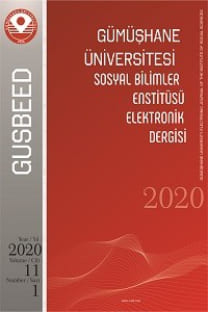İktisadi Aktivite ve İşsizlik Oranının Konut Talebi Üzerine Etkileri: Türkiye için Vektör Hata Düzeltme Modeli Tahmini
Konut satın alma ihtimali, İşsizlik oranı, İktisadi faaliyet, Vektör hata düzeltme modeli
The Impact of Economic Activity and Unemployment Rate on Housing Demand: Estimating a Vector Error Correction Model for Turkey
Probability of buying a house, Unemployment rate, Economic activity, Vector error correction model,
___
Akdoğan, K., Karaçimen, E., & Yavuz, A. A. (2019). Cross country evidence on the link between job security and housing credit. Journal of Housing and the Built Environment, 34, 947-963. https://doi.org/10.1007/s10901-019-09647-1Akseki, U. ve Türkcan, B. (2016). Türkiye’de bölgesel göç, konut ve işgücü piyasaları üzerine panel nedensellik analizleri. International Congress of Management Economy and Policy, 1871-1882.
Alkay, E. ve Övenç, G. (2019). ‘‘Farklı gelir gruplarının konut satın alabilirliğinde bölgesel farklılıkların incelenmesi. Uluslararası Siyaset Bilimi ve Kentsel Araştırmalar Dergisi, 7(1), 259-284. https://doi.org/10.14782/ipsus.539223
Cagli, E.C. (2019). Explosive behavior in the real estate market of Turkey. Borsa Istanbul Review, 19(3), 258-263. https://doi.org/10.1016/j.bir.2018.10.002
Ceritoğlu, E. (2020). Homeownership, housing demand, and household wealth distribution in Turkey. Emerging Markets Finance and Trade, 56, 1146–1165. https://doi.org/10.1080/1540496X.2018.1555461
Ceritoğlu, E., & Ganioğlu, A. (2019). What does the housing supply tell us? [Available online at: https://tcmbblog.org/wps/wcm/connect/blog/en/main+menu/analyses/what+does+the+housing+supply+tell+us], Retrieved on: January 5, 2021.
Coşkun, Y., & Jadevicius, A. (2017). Is there a housing bubble in Turkey? Real Estate Management and Valuation, 25(1), 48-73. https://doi.org/10.1515/remav-2017-0003
Coşkun, Y., Seven, Ü., Ertuğrul, H.M., & Alp, A. (2020). Housing price dynamics and bubble risk: The case of Turkey. Housing Studies, 35(1), 50-86. https://doi.org/10.1080/02673037.2017.1363378
Dickey, D. A., & Fuller, W. A. (1979). Distribution of the estimators for autoregressive time series with a unit root. Journal of the American Statistical Association 74(366), 427-431. https://www.jstor.org/stable/2286348
Dotti Sani, G. M., & Acciai, C. (2017). Two hearts and a loan? Mortgages, employment insecurity and earnings among young couples in six European countries. Urban Studies, 55(11), 2451-2469. https://doi.org/10.1177/0042098017717211
Fingleton, B. (2008). Housing supply, housing demand, and affordability. Urban Studies, 45(8), 1545-1563. https://www.jstor.org/stable/43197839
Gan, L., Wang, P., & Zhang, Q. (2018). Market Thickness and the impact of unemployment on housing market outcomes. Journal of Monetary Economics, 98, 27-49. https://doi.org/10.1016/j.jmoneco.2018.04.007
Gayrimenkul Yatırım Ortaklıkları Derneği (GYODER), https://www.gyoder.org.tr/uploads/GYODER%20Yayınları/GOSTERGE-CEYREK4-2019-web.pd f Accessed on Sep 1, 2020.
Girouard, N., & Blöndal, S. (2001). House prices and economic activity. (OECD Economics Department Working Papers, No. 279) OECD Publishing, Paris. https://doi.org/10.1787/061034430132
Halicioglu, F. (2007). The demand for new housing in Turkey: An application of ARDL model. Global Business and Economics Review, 9 (1), 62–74. https://doi.org/10.1504/GBER.2007.012509
Johansen, S. (1991). Estimation and hypothesis testing of cointegration vectors in gaussian vector autoregressive models. Econometrica, 59(6), 1551–1580. https://www.jstor.org/stable/2938278
URL 1: https://ec.europa.eu/eurostat/statistics-explained/index.php?title=File:Demographic_balance,_2019_(thousands).png, Retrieved on: January 20, 2021.
URL 2: https://ec.europa.eu/eurostat/statistics-explained/index.php?title=File:Youth_unemployment_rates_and_ratios,_2019,_persons_aged_15-24_(%25).png, Retrieved on January 20, 2021.
URL 3: https://data.tuik.gov.tr/Kategori/GetKategori?p=ekonomik-guven-117&dil=1, Erişim tarihi: 20.01.2021.
URL 4: https://ec.europa.eu/info/sites/info/files/file_import/questionnaires_tr_cons_en_0.pdf, Retrieved on January 20, 2021.
Usta, A. (2020). The role of sentiment in housing market with credit-led funding: the case of Turkey. Journal of Housing and Built Environment, 36, 577-600. https://doi.org/10.1007/s10901-020-09776-y
Yalçınkaya, Ö. ve Aydın, H. İ. (2017). Ekonomik ve politik belirsizliğin ekonomik büyüme üzerindeki etkileri: G-7+BRC ülkeleri üzerine bir panel veri analizi (1997-2015). Ege Akademik Bakış, 17(3), 419-430. https://doi.org/10.21121/eab.2017328407
- ISSN: 1309-7423
- Yayın Aralığı: Yılda 3 Sayı
- Yayıncı: Gümüşhane Üniversitesi
Zafer YILDIZ, Erol GENCER, Nuran Feyza GEZEGEN
Afete Hazırlık Davranışlarına Etki Eden Faktörlerinin İncelenmesi: Bir Yapısal Eşitlik Modellemesi
İbrahim DURMUŞ, Ahmet Mutlu AKYÜZ
Paternalist Liderliğin Örgütsel Sessizliğe Etkisi: Biga İlçesinde Bir Araştırma Örneği
Itır HASIRCI, Edip ÖRÜCÜ, Onur ŞEKER
İş Yaşamında Kronemik (Zamansal İletişim): Beyaz Yaka Çalışanlar Üzerinde Bir Araştırma
Çerçeveleme Etkisi: Asya Hastaliği Probleminin Gerçeğe Dönüşü Covid 19 Problemi
Ertelenmiş Vergi Varlığına ve Yükümlülüğüne Neden Olan Muhasebe Standartlarının Tespiti
Ümit ARKLAN, Samed SOY, Yılmaz Türker SANDIKCI
Bulanık Choquet İntegral Yöntemini Kullanarak Bir Covid-19 Sahra Hastanesi İçin Yer Seçimi
